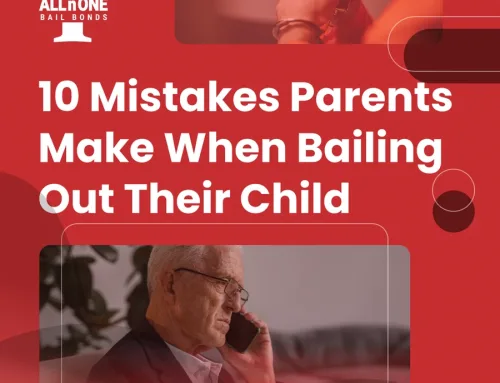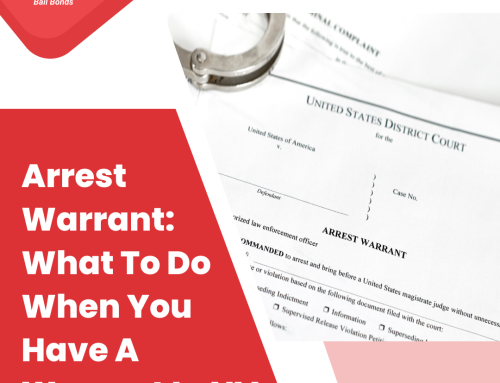When someone is arrested, their loved ones are often left feeling confused and overwhelmed about what to do. This is why All n One Bail Bonds has spent years helping people in the Las Vegas area with bail.
We offer fast, friendly service and can walk you through the entire bail bond process step-by-step. Our goals are to help your loved ones get home and to give you peace of mind.
For more information, call us anytime.
To learn about the difference between bond and bail, keep reading.
MORE: How bail bonds work in Las Vegas
The Difference Between Bond And Bail
Bail: This is cash, property, or some other form of payment that an arrested person gives to the court. It ensures the court that the person will appear for their court hearings and comply with all of the conditions of their release. After paying bail, the defendant is able to return to their life while their case continues.
Bond: A bond, on the other hand, is essentially a contract between the defendant, the bonding company, and the court. It’s a promise made by the bail bond agency that the defendant will keep the conditions of their release, which includes not committing other crimes.
Side Note: Bail bonds are also called jail bonds, surety bail bonds, or jail surety bonds.
Need to Find A Bail Bond Company?
If you need a quick and easy bail bond with flexible payment options in Clark County, Nevada, call All n One Bail Bonds at 702-333-2663 or visit the Online Bail Request page on our website. Once there, all you have to do is fill out our application form.
Further Reading: Bail Bond FAQs
Q 1: Why Do Bail Bonds Exist?
The reason bail bonds exist is that bail is very expensive, and most people cannot afford to pay it.
Instead of paying the full bail amount, bail bonds let defendants pay a premium to their preferred bail bond agency, which in Nevada is set by the state at 15% of the full bail amount.
This fee is non-refundable but secures the services of the bail bond company, which will post bond for the defendant.
Q 2: How To Get A Bail Bond?
To get a bail bond, the defendant must sign a bail bond agreement with their bonding company of choice. The bail bond company will pay the court the full bail amount, and the defendant will be released from jail.
Q 3: How Do Courts Set Bail?
Courts in Nevada generally set bail through a bail schedule with pre-determined bail amounts.
Both the Las Vegas Justice Court and the Las Vegas Municipal Court, for instance, have their own bail schedules with amounts in place for felonies and misdemeanors.
In Las Vegas, while bail amounts vary widely based on the offense, you can expect to pay the following bail amounts by category:
- Common misdemeanors – $1,000 to $5,000
- Gross misdemeanors – $2,000 to $5,000
- Felony – $3,000 to $20,000
Note: Not all offenses in Las Vegas have a standard bail amount. These offenses include battery with intent to commit sexual assault, attempted murder, and murder. Instead, judges look at these cases individually to determine what amount for bail (if any) is set.
Q 4: How Do You Lower Your Bail Amount?
To lower your bail amount, your attorney can make a request at your bail hearing.
You’ll have a much better chance of getting a positive reception if you work closely with your legal counsel to provide a convincing reason to the court for why you should be shown leniency.
Q 5: What Qualifies You For A Bail Reduction?
One of the things courts look at when considering your bail amount is how much of a flight risk you pose. If it’s likely
that you will skip bail, the court will incentivize you to behave properly by requiring you to pay a higher bail amount.
Or they may not even set a bail amount!
So, when presenting your case, you’ll want to convince the court that you will abide by all the conditions of your release and not create unnecessary strain on the legal system by skipping bail and forcing the court to track you down.
Q 6: What Are Bail Conditions In Nevada?
Bail conditions in Nevada include showing up for your scheduled court dates, not committing further crimes, and keeping your job.
These are fairly standard requirements.
Other requirements may include:
- Not traveling out of state or remaining within a certain jurisdiction.
- Entering a drug rehabilitation program (for drug-related cases).
- Surrendering one’s passport or (in certain extreme cases) firearms to law enforcement.
- Maintaining distance from the alleged victim.
- Participating in regular follow-ups with a police officer.
- Wearing an ankle monitor.
Q 7: How Are Bail Conditions Determined?
Before deciding on the conditions of a defendant’s release, the judge will look at the following details:
- How long the defendant has lived in the community.
- The defendant’s criminal history or lack thereof. (Also the defendant’s history of substance abuse, if any.)
- The defendant’s likelihood of skipping bail.
- The defendant’s reputation and whether someone close to them or someone else within the local community who knows them will vouch for them.
- The seriousness of the crime and why it was committed. (Severity and motive are quite important.)
- How likely the defendant is to be convicted.
- How likely the defendant is to commit another crime.
- The defendant’s work history and current financial situation.
- The mental health of the defendant.
Q 8: What Happens If You Violate Your Bail Conditions?
Bail jumping is never good and comes with its own set of penalties:
First: You won’t get your bail money back. If you pay cash bail, it will get confiscated, and if you get a bail bond through a bail bond company, the company will seek to recoup their loss.
Likewise, if a friend or family member posted cash bail for you, then they will lose that money and won’t get it back. Obviously, that’s not a good thing. Bail amounts are very expensive!
Second: Bail jumping is considered to be a misdemeanor, gross misdemeanor, or felony, depending on the case.
Skipping bail also means that a bench warrant will be issued for your arrest, which means that law enforcement will take you in at the first available opportunity—a potentially embarrassing situation!
Third: Bail jumping can result in fines ranging from $1,000 to $2,000 and jail time of up to nearly a year, although the specific details will vary per case.
In other words, skipping bail is a bad idea and will only make your situation more complicated. We certainly advise against it!
Q 9: Is It Possible To Get Bail Without Conditions?
No.
Even a lenient court will require you to show up for your court hearings, which is itself a condition.
With that said, if the details of your case warrant it, you may be able to convince the court to grant you release conditions that aren’t overly strict or demanding.
Q 10: How Do I Post Bail In Las Vegas?
To post bail in Las Vegas, you first must be aware of the different jail facilities in the city. They are as follows:
- Las Vegas Detention Center (Las Vegas City Jail)
- Clark County Detention Center (CCDC, but it is also sometimes called the Las Vegas Detention Center)
- Henderson Detention Center (also known as the Las Vegas Immigration Jail)
- North Las Vegas Community Correctional Center (North Las Vegas CCC, North Las Vegas Detention Center, or North Las Vegas Jail)
Here are the instructions for each one:
1. Las Vegas Detention Center:
To pay bail at this facility, go to 3200 Stewart Ave., Las Vegas, Nevada 89101. You’ll find the bail window on the west side of the “City of Las Vegas Department of Public Safety” building.
We recommend bringing a credit card to pay bail, although several forms of payment are allowed. Before going to pay bail, you should call the center and inquire with them about what payment methods they are currently accepting.
If you need or want our help posting bail, call us at (702) 333-2663. We make the bail bond process easier and also less costly upfront for you since you don’t have to pay your full bail amount when working with us.
The state of Nevada sets bail bond premiums at 15% of the total bail amount, which means (for example) that you only pay a $300 premium on $2,000 worth of bail when getting a bail bond.
2. Clark County Detention Center:
In order to pay bail here, you need to go to the “pre trial services” bail bond window or go to the Regional Justice Center. Which one you go to hinges on which court your case is under—the Justice Court or the District Court.
For Justice Court bail, you’ll visit the pre trial services bail bond window, which is open 24/7. For District Court bail, you’ll visit the Regional Justice Center, which is open from 8:00 am to 5:00 pm.
Both locations charge a $50 fee for bail bonds. Neither location accepts personal checks, although you can pay with cash, credit card, money order, or cashier’s check.
To learn more about the Clark County Detention Center, the main jail facility in Las Vegas, see the link.
3. North Las Vegas Community Correctional Center:
If your case is with the North Las Vegas Community Correctional Center, there are two places you can pay bail.
The first is the North Las Vegas Municipal Court. Available hours are Monday through Thursday from 7:00 am to 5:00 pm. This location accepts cash bail.
The second is the North Las Vegas CCC, which you would use for posting bail after hours. This location does not accept cash bail.
Both facilities are located at 2332 Las Vegas Blvd N., making them very easy to find.
4. Henderson Detention Center:
To pay bail at Henderson Detention Center, you can visit the bail gate, which is located behind the courthouse at S. Texas Ave. You can also visit the Henderson Municipal Court and Henderson Justice Court at 243 Water Street, Henderson, NV 89015.
Hours for the two courts are 7:00 am to 5:00 pm, Mondays through Thursdays.
To learn the most current hours for the bail gate at Henderson Detention Center, please call the center directly. If you need our help with the bail bond process, call us today.
Q 11: What Is The Purpose of Posting A Bond?
Courts require defendants to pay bail or post bond because this acts as a strong incentive for them to show up for court and abide by the other conditions of their release.
Bail is the mechanism courts use to help keep the legal system operating smoothly.
Q 12: Why Should You Post Bail?
Posting bail is a good idea since it allows you to get out of jail quickly while your trial unfolds. The last thing you want to do is wait in jail for weeks or months (or, in some rare cases, years) before your trial concludes.
Needless to say, if you are found innocent, then you’ll have spent all that time in jail for no reason!
Getting out of jail gets you back to your family and also gives you the time and space you need to work with an attorney and prepare a solid defense.
Q 13: Can You Post Bail For DUI?
Yes.
However, since DUIs are so common in Las Vegas, especially during the busy holiday season with so many tourists, we’d like to mention that defendants who have been arrested for an alcohol DUI will not get released from jail until they show a blood alcohol content of less than 0.04%.




